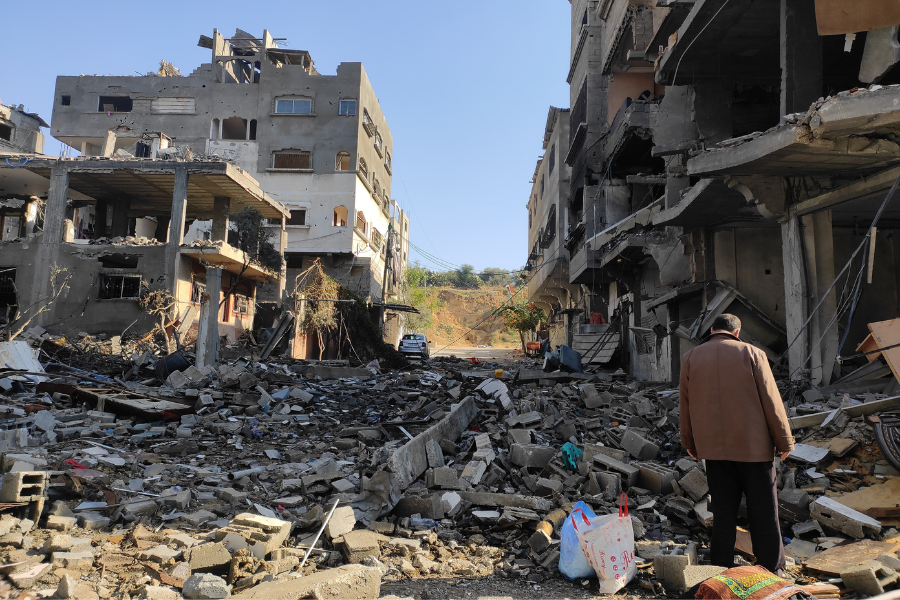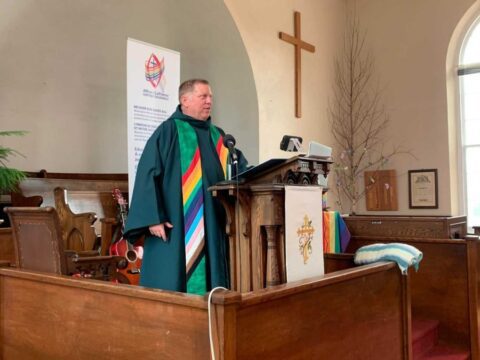The United Church of Canada has sent a second letter to Prime Minister Justin Trudeau asking Canada to ban arm sales to Israel and support South Africa’s case against Israel at the International Court of Justice.
In a letter addressed to Prime Minister Justin Trudeau, Rev. Michael Blair, General Secretary of the United Church of Canada, urges the prime minister to halt the transfer of weapon systems to Israel and to support South Africa’s case with the international court (ICJ) which claims Israel’s actions in Gaza violate the Convention on the Prevention and Punishment of the Crime of Genocide. South Africa seeks provisional measures, including an immediate halt to Israel’s military operations. The ICJ, after hearing arguments on Jan. 11 and 12, ruled on Jan. 26 that Israel must take measures to prevent genocide.
You may unsubscribe from any of our newsletters at any time.
“Our partners in the region are urging the United Church to raise the question around genocide and for us to advocate for Canada’s endorsement of South Africa’s application against Israel at the ICJ,” said Blair.
Blair, in response to the urgent call from the United Church’s partners to have this letter released ahead of the ICJ hearings, signed this letter “as the Moderator, the official spokesperson for the United Church, was away on a study break,” he said.
“We’re all struggling to find a way to be responsive to what is happening in Gaza, and it’s complicated and complex. So, the moment that we can take to kind of amplify the voices of our partners in the region, who are asking us to be in solidarity with them, we took that moment,” said Blair.
Blair addressed critics who argue the United Church is overstepping its role in addressing international political matters.
“The important thing is to speak the truth and recognize that it may lead to conflict. The challenge lies in how we live through that conflict,” said Blair.
Rev. Japhet Ndhlovu, executive minister for church in mission of The United Church of Canada, said he has spoken to the United Church’s partners in the region, and they have confirmed the humanitarian crisis in Gaza.
“Our partners said they are experiencing a severe crisis in health services as most of the medical facilities have been bombed or destroyed,” said Ndhlovu.
Our partners “explain that there’s also challenges around food supplies as vehicles are not consistently allowed in. So not everybody’s being fed, and people do not know when their next meal will be. There’s a crisis around energy. Electrical power supplies have been cut off. There’s a crisis around water as sources of water have been cut off,” he said.
Ndhlovu said there is also a crisis of where people should sleep. Their homes were bombed, which forced them to sleep in tents provided by the United Nations High Commission on Refugees and Action By Churches Together (ACT) Alliance. He explains that the situation’s volatility raises safety concerns and people are unsure where to find secure refuge.
“So, in terms of the humanitarian crisis, it’s those issues of basic essentials around food, energy, water, health,” said Ndhlovu. “It’s a crisis… the situation is quite dire.”
More on Broadview:
- United Church and National Indigenous Council name Israel-Hamas war a genocide
- United Church condemns violence by Hamas and Israel and calls for ceasefire
- Imagining a Middle East where love and hope flourish
Blair said these issues and the risks of Canadian military exports to Israel are detailed in a report entitled “Fanning the Flames: The Grave Risk of Canada’s Arms Exports to Israel,” issued by Project Ploughshares, the peace research institute of The Canadian Council of Churches, specializing in disarmament and international security.
Kelsey Gallagher, Project Ploughshares’ lead researcher, corroborated the report’s data, compiled from federal government records and information gathered from experts around the world.
“The data shows there are significant loopholes with Canadian arms exports to the United States, especially military components which are not regulated and reported. These are then used in the Israeli F-35I joint strike fighter used in the ongoing bombing of Gaza,” said Gallagher.
“In a December vote at the UN, Canada joined most of the world community in calling for a ceasefire. Now we want to see concrete action. Canadian officials must revoke existing permits for the transfer of weapons systems to Israel that can be used in the ongoing bombing of Gaza,” he said.
Rabbi Mendel Zaltzman from the Jewish Russian Community Centre of Ontario emphasized that the United Church should recognize that solidarity with Gaza must encompass support for Israel as well.
“Israel faces security challenges, including threats from terrorist groups like Hamas in Gaza. The United Church should acknowledge that Israel has a right to defend itself and its citizens from attacks and terrorism originating from Gaza,” said Zaltzman.
Beau Shaw, co-chair of the Independent Jewish Voices-Calgary chapter stresses signatories to the Genocide Convention, including Canada, are obliged to prevent actions that could potentially lead to genocide.
“The letter underscores the humanitarian crisis and Israel’s involvement and urges the international community, particularly Canada, to pay attention and take decisive action. The ICJ will decide genocide, a process taking years. So Canada should support preventative measures to stop the escalation of violence,” said Shaw.
Richard Marceau, vice-president, external affairs and general counsel at the Centre for Israel and Jewish Affairs, said that while acknowledging the humanitarian situation in Gaza, it’s vital to recognize Israel’s efforts to minimize civilian harm which is more than many other nations in urban warfare.
“I understand the emotional response to death and destruction because I have shared that. I share in that pain. I share the sadness. The situation in Gaza is tragic, and the loss of even one innocent person is tragic. But Israel has taken more measures to avoid harming civilians than any other nation that fought an urban war. Pro-Israel does not mean anti-Muslim or anti-Palestinian,” said Marceau.
Marceau stresses the need for Canada to support Israel considering Hamas’ terrorist attack on Israel on Oct. 7, 2023.
“We cannot talk about the situation as Israel-Gaza conflict. We need to include Hamas attacks on Israel and its use of Palestinian civil infrastructures and people as shields, showing disregard for Palestinian lives,” said Marceau.
Global Affairs Canada has since issued a statement online by Mélanie Joly, Minister of Foreign Affairs on Jan. 12, stating that “Canada’s unwavering support for international law and the ICJ does not mean we accept the premise of the case brought by South Africa.”
Siveen Salha-Diab, a community organizer in Calgary’s Palestinian community, said she can confirm the harsh realities and pressing concerns faced by the people in Gaza.
“My mom is actually there (in Gaza), and my brothers and sisters. My mom is living in a tent, and she’s 74 years old,” said Salha-Diab.
Salha-Diab urges the international community to unite and commit to ending these human rights violations.
“It’s not just about Palestinians but human rights and the humanitarian crisis. We must not turn a blind eye but act now to prevent this from ever happening again,” said Salha-Diab.
Blair explains that the path ahead is uncertain, and the dynamics of international relations and the pursuit for justice and peace in the region continue to evolve.
“There are instances where Canada steps up to address human rights violations, and this particular situation appears to pose a challenge for the Canadian government. However, it extends beyond Canada, as many other governments globally struggle with the complexity and historical complicity surrounding the Holocaust,” said Blair.
***
M. L. Witkowicz is a writer based in Toronto, Ont.














Any thought given to the Israeli hostages and to Hamas atrocities on Oct 7th?
Stop supplying arms to Israel eh? Wouldn’t that be the same as supporting the terrorists? Don’t folk’s remember who started this?
Don’t folks remember six million Jews slaughtered in WW2? Don’t people recall that the goal of HAMAS is to eliminate Israel from the face of the earth? What does one do when one’s enemy does not wear a uniform? What does one do when one’s enemy hides behind sick people in hospitals or fires rockets from school yards or has hundreds of miles of tunnels with weapons and command posts and living quarters for fellow terrorists right under the people’s feet? How does one eliminate it’s enemy when we don’t know the enemy from the population? How is it possible to deal diplomatically with a terrorist organization funded by a terrorist regime? Sure. Don’t give Israel any weapons. Let them be slaughtered. Take the side of the terrorists. Then what?